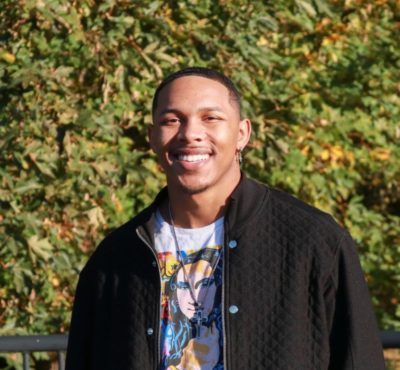 Marcus Jackson ’22
Marcus Jackson ’22Marcus Jackson ’22 is a man of many interests. A first-generation student from Kent, WA, Jackson was initially planning to go to art school for college. When he visited his first-choice school and didn’t fall in love with it, his friends encouraged him to consider Pitzer, where he could explore anything that he wanted, both academically and socially.
“I took a leap of faith,” said Jackson. “When I got here, it was unsettling at first, but after the Orientation Adventure trip, I felt comfortable and met great people.”
On May 14, Jackson graduated from Pitzer as a biology major on the premed track and an Asian American studies minor. Although he did not take a single art class at Pitzer, he found other ways to embrace his passion for art. In addition to painting in his free time, Jackson became a fellow with the Pitzer College Art Galleries. Using curatorial practice as a tool, Pitzer College Art Galleries fellows develop student-centered programs and interdisciplinary projects that engage the Pitzer community around racial justice, gender equality, and socioeconomic equity.
Jackson later became the inaugural awardee of the Benjamin Godsill ’00 and Anna Burns Student Apprenticeship Award, which offers first-generation and students of color opportunities to gain hands-on, in-depth curatorial experience at innovative arts organizations. In spring 2022, Jackson worked with the Los Angeles Contemporary Exhibitions’ Emerging Curator Cat Jones on a show about honoring Black trans masculinity in Reclaiming Performance: A Reverence of Self.
“I was able to help for the entire journey, from start to finish,” said Jackson. “Getting this experience as a senior and feeling like I’ve done something in the art community in Los Angeles meant a lot to me. It felt surreal that I was actually doing it.
“The experience was fruitful, and I learned a lot personally and artistically. It was cool to be a part of a gallery that has a large impact on the community around it and gives voice to marginalized groups through different exhibitions, performances, and installations.”
Art has not been Jackson’s only passion. Jackson attended a STEM-oriented high school, and in middle school, he volunteered at Ronald McDonald House Charities, where he spent time with children undergoing cancer treatment. Jackson says that his interest in oncology stemmed from that experience. Not long after coming to Pitzer, Jackson set his sights on becoming a doctor.
“For me, the goal of being premed ultimately is to give a certain amount of representation and equitability in the medical field that isn’t there currently,” said Jackson. “There are no doctors in my family, and there are few Black doctors out there. You hear about how people of color are treated differently in the medical field, and that is largely due to lack of representation.”
Jackson has noticed the same lack of representation in science education. “I want to make sure that, as an alumnus, I am a contact for students who want that help and experience,” said Jackson.
Now that he has graduated, Jackson will take a gap year to prepare for his premed application and the MCAT with the goal of specializing in oncology.
“I have this odd tendency to go into fields where I’m least represented,” said Jackson. “Boys aren’t told to do art because drawing and painting are ‘for girls.’ It was the same with Asian American studies. I’ve never taken a class with another Black person. It’s the same now with me becoming a doctor.”
While at Pitzer, Jackson was involved in the Black Student Union, played intramural basketball, and served as a Residential Assistant. Jackson is a recipient of Jeffery Robert Frum ’12 Endowed Scholarship, which was established in memory of a Pitzer alumnus to help students fulfill their dreams of pursuing their college education at Pitzer.
Jackson’s advice to current and future students is to never let anyone else steer your career as a student and beyond and to seek help when you need it.
“Always reach out to people—whether it’s your RA, your friends, or faculty,” said Jackson. “You lose a lot of knowledge, insights, and nuances of the college experience from not interacting with those people. I’ve talked with other first-gen students about getting over the fear of being the person who doesn’t know something. There’s a certain amount of growth that people need. It’s fine to ask for help. It’s better to have the help and not need it, rather than need it and not have it.”